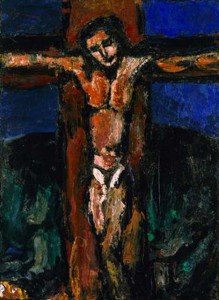Have this mind among yourselves, which is yours in Christ Jesus,
Who, though he was in the form of God,
did not count equality with God a thing to be grasped,
but emptied himself,
by taking the form of a servant,
being born in the likeness of men.
And being found in human form,
he humbled himself
by becoming obedient to the point of death,
even death on a cross.
Therefore God has highly exalted him
and bestowed on him the name that is above every name,
so that at the name of Jesus
every knee should bow,
in heaven and on earth and under the earth,
and every tongue confess that
Jesus Christ is Lord,
to the glory of God the Father.
—Philippians 2:5-11, ESV
 The hymn text above from Paul’s letter to the Philippians is one of the most beautiful summaries of the story of Jesus the Christ found in scripture. The self-emptying love of the Incarnate God, (or Kenosis) is at the very center of the entire biblical narrative. We read that the only Son of God did not consider equality with God as something to be grasped at, but in contrast, took on the scandal of the deepest fear of all mankind: an ignominious, painful, agonizing and humiliating death and descent into the lowest region of God-forsakenness.
The hymn text above from Paul’s letter to the Philippians is one of the most beautiful summaries of the story of Jesus the Christ found in scripture. The self-emptying love of the Incarnate God, (or Kenosis) is at the very center of the entire biblical narrative. We read that the only Son of God did not consider equality with God as something to be grasped at, but in contrast, took on the scandal of the deepest fear of all mankind: an ignominious, painful, agonizing and humiliating death and descent into the lowest region of God-forsakenness.
The focus of this hymn stands in stark contrast to the narrative of another biblical figure, said also to bear the very image of God, who did attempt to cling to equality with God—Adam. The primal sin of Adam was the arrogant grasping after Godliness, and we, fellow sinners, have inherited the same propensity. We want to be God. In his Kenosis, Christ Jesus reverses this sin of Adam, reconciling, restoring and healing all of us to true union with God.
![Cross [IC XC NIKA Jesus Christ Victorious]](/wp-content/uploads/2013/03/111-e1364493814704.jpg) As we enter into the core of Holy Week, let us remember the costly, immense sacrifice of our Savior, bearing our arrogance, humiliation and sorrow. But let us also enter into the victory of Christ, celebrating the fullness of the divine life that reconciles all humankind to God.
As we enter into the core of Holy Week, let us remember the costly, immense sacrifice of our Savior, bearing our arrogance, humiliation and sorrow. But let us also enter into the victory of Christ, celebrating the fullness of the divine life that reconciles all humankind to God.
Remember.
